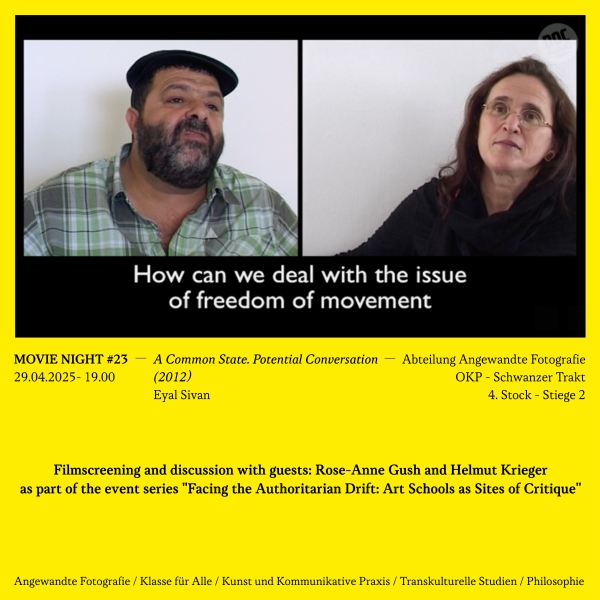What is utopian, what is realist? Do these terms even mean
anything regarding the situation in Palestine-Israel? In 2012, Eyal Sivan, an Israeli filmmaker, and Eric Hazan, the french
editor of the éditions La Fabrique which has consistently published on the situation in Palestine for the last thirty years,
published a book together, accompanying the film. The title: A common state between Jordan and the sea.
The film of the same name assembles a series of 24 conversations regarding the issue of a common state,
with political actors, artists, jurists, young and old, Israelis Jews, Arabs of the occupied territories and of Israel. The
same questions are asked and each person answers in their maternal tongue, in dialogue with the filmmaker: the screen is partitioned
between an Israeli Jew and a Palestinian: one talks and the other listens, and vice versa. The screen brings together what
the fragmentation of the situation separates, producing the encounters that occupation hinders day after day.
On
this movie night, we will watch the two-hour film with breaks and discuss each of its thematic chapters.
Hosted
by Movie Nights Group: Anahita Asadifar, Sofia Bempeza, Antonia Birnbaum, Yasmina Haddad, Fine Freiberg, Nanna Heidenreich,
Amanda Holmes, Annette Krauss, Alexi Kukukljevic, Andrea Lumplecker, Zeynep Turel, Maria Ziegelböck
Movie
Nights is a format for a transdisciplinary exchange: Starting each time from one film, we open the space for a conversation
about the relations between production of images and their conditions – modes of narration, authorship, history, politics
and effects on society. We show fiction, documentaries, movie and television productions in regard to the actual situation,
focusing on Palestinian and Israeli films. The movie nights are hosted and organized by the departments of Applied Photography,
Klasse für Alle, Art and Communication Practices, Philosophy, and Transcultural Studies at the University of Applied Arts
Vienna.
Dr. Rose-Anne Gush is currently Assistant Professor at IZK - Institute for Contemporary
Art at TU Graz. Her research interests include political aesthetics and theories of ‘global art’, the relationships between
colonialism, fascism and capitalism, and gender and ecology. Recent articles are published in Berlin Review, FKW // Zeitschrift
für Geschlechterforschung und visuelle Kultur, Camera Austria, Brand-New-Life Magazine, Third Text, and Kunst und Politik.
Her first monograph,
Artistic Labour of the Body, is forthcoming in the Historical Materialism book series with Brill
and Haymarket.
Dr. Helmut Krieger, senior scientist and senior lecturer at the Department of Development
Studies at the University of Vienna, holds a PhD in political science. His research areas are, among other things, Israel/Palestine,
social movements in the Arab speaking world, transformative research epistemologies for conflict and war zones as well as
critical political economy perspectives combined with decolonial approaches.
Facing the Authoritarian Drift:
Art Schools as Sites of Critique is organized since Autumn 2024 by teachers at German-speaking art schools, and confronts
the current authoritarian drift. In the aftermath of the Covid-19 pandemic, under the pressure of the climate crisis, and
in the face of wars and increasing militarization, conflicts are also intensifying within universities (...). More information
here.




